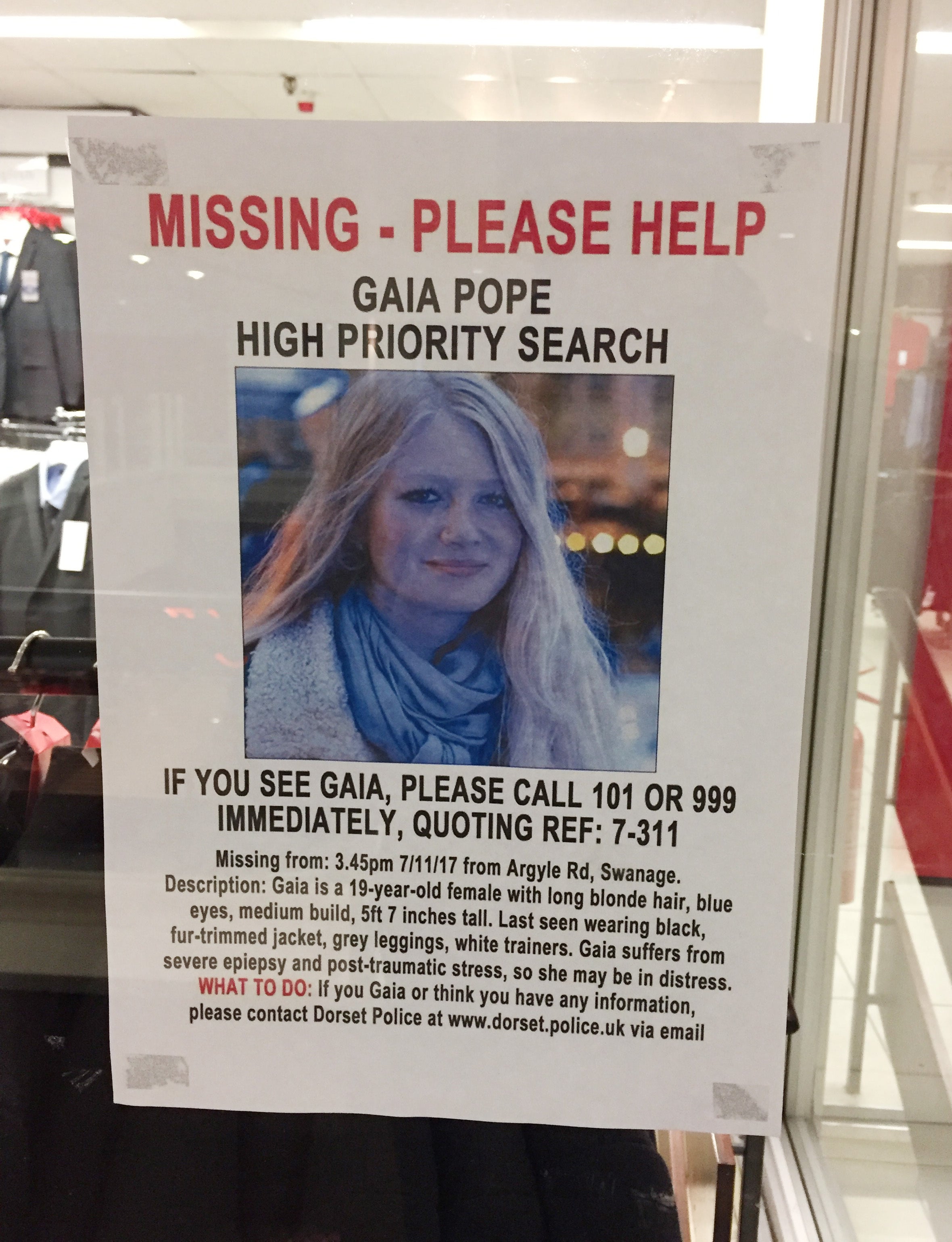Inquest hears of repeated delays in search for Gaia Pope-Sutherland
A chief inspector had to twice ask uniformed Pcs to carry out searches around Swanage town centre in Dorset after the 19-year-old went missing.

Your support helps us to tell the story
From reproductive rights to climate change to Big Tech, The Independent is on the ground when the story is developing. Whether it's investigating the financials of Elon Musk's pro-Trump PAC or producing our latest documentary, 'The A Word', which shines a light on the American women fighting for reproductive rights, we know how important it is to parse out the facts from the messaging.
At such a critical moment in US history, we need reporters on the ground. Your donation allows us to keep sending journalists to speak to both sides of the story.
The Independent is trusted by Americans across the entire political spectrum. And unlike many other quality news outlets, we choose not to lock Americans out of our reporting and analysis with paywalls. We believe quality journalism should be available to everyone, paid for by those who can afford it.
Your support makes all the difference.There were several delays by the police in starting a 300-metre search of the area where Gaia Pope-Sutherland was last seen, an inquest heard.
A chief inspector had to twice ask uniformed Pcs to carry out searches around Swanage town centre in Dorset after the 19-year-old went missing.
The college student, who had severe epilepsy, ran away from her aunt’s home on the afternoon of November 7 2017.
Dorset Coroner’s Court has heard Miss Pope-Sutherland’s case was originally graded as medium risk before being upgraded by a control room inspector at about 1.30am the next day.
They contacted a specialist police search adviser who recommended examining a 300-metre area around Morrison Road, where Miss Pope-Sutherland was thought to have last been seen, although it was actually in nearby Manor Gardens.
Superintendent Heather Dixey told the jury she was working as the force incident commander in the control room from 7am to 3pm on November 8.
She said that after beginning her shift, she organised the release of information to the media about Miss Pope-Sutherland being missing and at 8.06am tasked the 300-metre search of Swanage town centre to be carried out by three Pcs and two PCSOs.
But by 11am it had still not started, so again she ordered it to be done.
“They were obviously doing other inquiries and hadn’t done the search as I asked them to,” Ms Dixey, who at the time was a chief inspector, told the court.
“That’s why gave the direction at 11.18am that this must be undertaken.”
Sarah Clarke QC, counsel to the inquest, asked Ms Dixey of her opinion on the search having not started given its importance to a missing person inquiry.
Ms Dixey replied: “It needed to be done and it was one of the priorities, hence that’s what I wrote there that I wished them to now focus as I asked them to do it at 8am, to focus on that particular area.”
The court heard that at 1.33pm a uniform Pc wrote a log entry detailing outstanding actions, including a 300-metre search from Manor Gardens, and also advising another search starts from the Miss Pope-Sutherland’s aunt’s home in Argyle Road.
Miss Clarke suggested to Ms Dixey that the log entry implied the search had still not started.
The officers replied: “It would suggest that, and he’s also written about the uncertainty of order, although he had been quite clear at that point that it’s from Manor Gardens.”
The court was told five officers would not have been enough to search the number of properties within the town centre and more staff would have been needed.
Asked about resources, Ms Dixey said: “It’s a daily issue for policing nationally, not just Dorset Police. We have many incidents and many people at risk who ring us for help.
“My responsibility is to try and prioritise and balance that and provide a service to the public as best we can all the time.
“While this is absolutely an important priority, we still have to have officers to be able to answer 999 calls for immediate threat to life as well across the force.”
Rachael Griffin, the senior coroner for Dorset, asked Ms Dixey whether by the time she came on duty – with Miss Pope-Sutherland now missing for 15 hours – “enough been done” to find her.
“The searches done initially, as far as I could see in the evening, it is difficult to do anything in the absolute dark hours,” she replied.
“But, yes, more officers could have been tasked in the evening to go further but it was very difficult for them to have certain areas to focus on at that time.
“They could have commenced a 300-metre search the previous evening.”
The coroner suggested that inquiries of the student’s GP or asking a local hospital for access to her medical records could have started the night before and there had been a delay of 12 hours.
“Yes,” Ms Dixey replied.
The inquest continues.